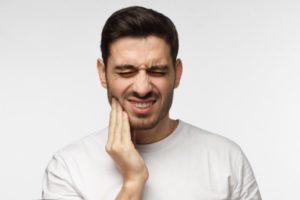
When you bite into an ice cream cone, are you immediately met with sensitivity and discomfort? It’s estimated that over 40 million Americans suffer from tooth sensitivity, and if you’re one of them, you may have become used to this sensation. Hot drinks, cold foods, even cold weather, and a host of other factors can cause tooth sensitivity. Thankfully, your dentist in Springfield has some tips for managing this pain. Keep reading to see how you can smile with confidence and comfort!
But First, Why Does Teeth Sensitivity Occur?
Teeth sensitivity will typically happen when your enamel is no longer properly protecting the inside, more sensitive portion of the tooth. If a tooth is damaged, broken, decayed, or chipped, you will often experience sensitivity to hot or cold objects because the tiny nerve endings in your tooth are exposed. Teeth grinding is also a common cause of sensitivity because your smile is put through extra wear and tear. Additionally, gum recession can expose sensitive parts of the teeth, which is why gum disease is another factor that can lead to discomfort when eating hot or cold items.
Can You Minimize Your Discomfort?
The good thing about sensitive teeth is that there are some steps you can take to mitigate your day-to-day discomfort, including:
Brushing Technique
Did you know there is such a thing as brushing your teeth too hard? Scrubbing your teeth can wear away enamel, causing increased sensitivity. Instead, use a soft-bristled toothbrush and think of your at-home cleaning like a smile massage. Move your brush in a circular motion for a thorough and safe routine.
Toothpaste
Make sure you’re using a nonabrasive toothpaste. Some products may contain abrasive materials or ingredients for bleaching that can weaken your tooth enamel. Instead, pick a toothpaste with the American Dental Association seal on it and check with your dentist to make sure that it’s nonabrasive.
Dental Visits
See your dentist for regular checkups and cleanings. They will prevent and detect tooth decay before it gets worse, and they can also make dental hygiene recommendations based on your smile. The lower your risk of decay and cavities, the lower your chances of tooth sensitivity.
Mouthguard
Because teeth grinding and dental injury are common causes of sensitivity, it’s important to use a mouthguard for physical activity, and you can sleep with a nightguard to prevent grinding. Both of these oral appliances can be custom-made by your dentist for the best results.
Diet
Certain foods like sour, chewy, or hard candies can increase your risk of sensitivity because they allow sugar to coat your teeth for longer periods of time. When sugar reacts with the bacteria in your mouth, it creates acids that cause decay, leading to higher risks of sensitivity. Instead of candy and soda, reach for water and fruits because both of these items naturally wash away plaque and bacteria.
Teeth sensitivity doesn’t have to ruin your day! Remember these tips to enjoy a healthy and happy smile!
Meet the Dentist
Dr. Scott Olson is an experienced dentist who wants his patients to remain comfortable even while outside of his office. That’s why he wants you to know this important information about teeth sensitivity. For any questions, he can be reached through his website or by phone at (417) 823-4900.
